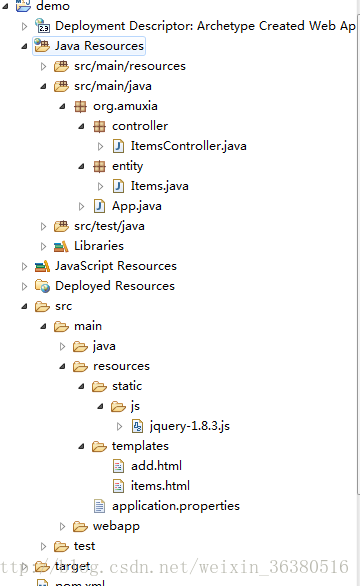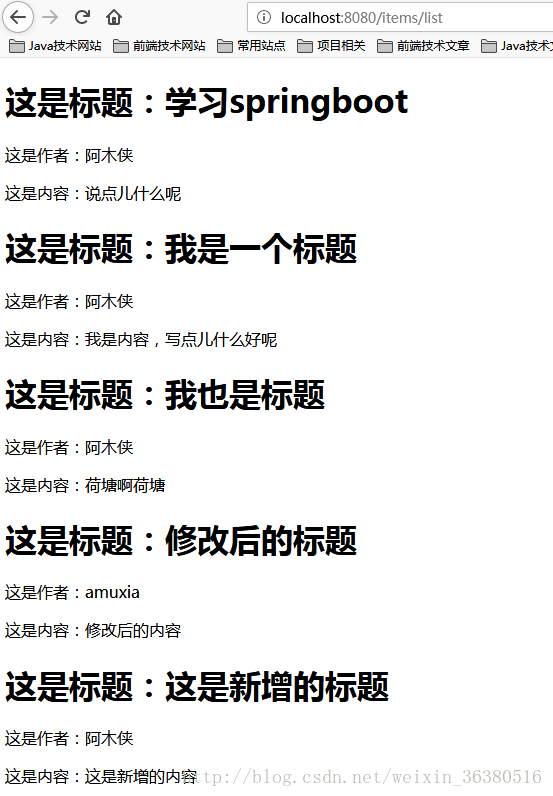上一篇介绍了使用jsp完成数据的页面展示 ,但是springboot并不推荐使用jsp,会产生很多问题。官方推荐使用thymeleaf,这里我们将上一篇的jsp页面展示修改为使用thymeleaf,通过对比来熟悉thymeleaf,其实改动的地方并不大。
第一篇springboot入门时介绍了项目的大致结构,当时图省事所有的类都放在一个包中,这里略做调整,然后再resource下新建文件夹存放thymeleaf模板,使用springboot生成工程时应该会默认有这几个文件夹,此时项目结构大致如下:

为thymeleaf添加依赖
<dependency>
<groupId>org.springframework.boot</groupId>
<artifactId>spring-boot-starter-thymeleaf</artifactId>
</dependency>
查询接口(接上一篇,基本没变)
/**
* @return
* 查询全部信息
*/
@RequestMapping("/list")
public ModelAndView itemsList() {
String sql = "select * from items";
List<Map<String, Object>> list = jdbcTemplate.queryForList(sql);
ModelAndView mav = new ModelAndView("items");
mav.addObject("list", list);
return mav;
}
对应thymeleaf 模板页面
<!DOCTYPE html>
<html xmlns:th="http://www.thymeleaf.org">
<head>
<meta charset="utf-8" />
<meta name="viewport" content="width=device-width, initial-scale=1.0" />
<title>springboot学习</title>
</head>
<body>
<div th:each="item : ${list}">
<h1 th:text="${{item.title}}"></h1>
<p><a th:text="${{item.name}}"></a></p>
<p><a th:text="${{item.detail}}"></a></p>
</div>
</body>
</html>
此时我们运行http://localhost:8080/items/list,和jsp输出结果无异

代码很便捷,和上一篇的jsp遍历list数据差别不大,通过对比也能很好的掌握thymeleaf 的用法,这里用 th:each 放入需要遍历的内容,以及定义变量名;在其他标签中用th:text来展示内容,写法也很容易理解。
新增接口
/**
* 新增数据
* @param items
* @return
*/
@RequestMapping("/add")
public @ResponseBody boolean addItems(Items items) {
String sql = "insert into items (title,name,detail) value (?,?,?)";
Object args[] = {items.getTitle(),items.getName(),items.getDetail()};
int temp = jdbcTemplate.update(sql, args);
if(temp > 0) {
return true;
}
return false;
}
对应的thymeleaf 模板页面
<!DOCTYPE html>
<html xmlns:th="http://www.thymeleaf.org">
<head>
<meta charset="utf-8" />
<meta name="viewport" content="width=device-width, initial-scale=1.0" />
<title>springboot学习</title>
<script th:src="@{/js/jquery-1.8.3.js}"></script>
</head>
<body>
<div>
<form name="addItems">
<input type="text" name="title" />
<input type="text" name="name" />
<input type="text" name="detail" />
<input type="button" value="提交" onclick="return add()"/>
</form>
</div>
</body>
<script type="text/javascript">
function add(){
var title = addItems.title.value;
var name = addItems.name.value;
var detail = addItems.detail.value;
$(document).ready(function(){
$.post("add",
{"title":title,"name":name,"detail":detail},
function(data){
if(data == true){
alert("新建成功");
}
if(data == false){
alert("新建失败");
}
});
});
}
</script>
</html>
表单提交方式的写法(更多可以参考:http://itutorial.thymeleaf.org;很全面)
<!DOCTYPE html>
<html xmlns:th="http://www.thymeleaf.org">
<head>
<title>Thymeleaf tutorial: exercise 12</title>
<link rel="stylesheet" href="../../../css/main-static.css" th:href="@{/css/main.css}" />
<meta charset="utf-8" />
</head>
<body>
<h1>Thymeleaf tutorial - Solution for exercise 12: forms</h1>
<h2>Customer edition</h2>
<form action="saveCustomer.html" th:action="@{/exercise12/saveCustomer.html}" th:object="${customer}" method="post">
<input type="hidden" th:field="*{id}" />
<label for="firstName">First name:</label>
<input type="text" th:field="*{firstName}" value="John" />
<label for="lastName">Last name:</label>
<input type="text" th:field="*{lastName}" value="Wayne" />
Genre:
<div th:each="gender : ${genders}" class="radio">
<input type="radio" th:value="${gender}" th:field="*{gender}" />
<label th:for="${#ids.prev('gender')}" th:text="${gender.description}">Male</label>
</div>
<div th:remove="all" class="radio">
<input type="radio" />
<label>Female</label>
</div>
<label for="paymentMethod">Payment method:</label>
<select th:field="*{paymentMethod}" th:remove="all-but-first">
<option th:each="paymentMethod : ${paymentMethods}"
th:value="${paymentMethod}" th:text="${paymentMethod.description}">Credit card</option>
<option>Another payment method</option>
<option>Another payment method</option>
</select>
<label for="balance">Balance (dollars):</label>
<input type="text" th:field="*{balance}" size="10" value="2500" />
<input type="submit" />
</form>
</body>
</html>
这里列举常见用法:
1、在html页面中引入thymeleaf命名空间:<html xmlns:th=http://www.thymeleaf.org></html>,此时在html模板文件中动态的属性使用th:命名空间修饰 ;
2、引用静态资源文件:比如CSS和JS文件,语法格式为“@{}”,比如引用resource/static/js下的jquery文件:<script th:src="@{/js/jquery-1.8.3.js}"></script>;
3、页面显示时将时间的格式化: ${#dates.format(worker.updateTime,'yyyy-MM-dd HH:mm:ss')} 表示将时间格式化为”yyyy-MM-dd HH:mm:ss”;
4、字符串拼接:比如拼接这样一个URL:/items/delete/{itemId} 写法是:th:href="'/items/delete/' + ${items.id }"
5、for循环遍历出数据,以上查询全部中已有例子:<div th:each="item : ${list}"><h1 th:text="${{item.title}}"></h1></div>
 IDEA激活码
IDEA激活码


